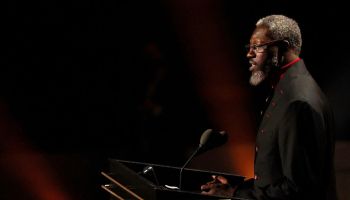The New York Times examines whether the expectation of fidelity is poisoning marriages — and if honesty about cheating may be the cure
Monogamy isn’t for everyone. At least that’s what some people say.
An article in Sunday’s New York Times Magazine by Mark Oppenheimer gives a national spotlight to the idea that monogamy is a largely unrealistic expectation. According to Oppenheimer, couples need to “have a conversation about what it’ll mean if one or the other partner should cheat,” and should understand that their relationship is more important than “sexual exclusivity.”
But it’s not all about sex: Jessica Grose at Slate.com, says that the ramifications of infidelity to a relationship extend further — and deeper — than sex. Especially with high-profile cases like Arnold Schwarzenegger’s, it’s the humiliation and betrayal that is “more destabilizing than just sex.”
And couples do need to talk about this: Honesty and transparency are key, says Anna North at Jezebel.com. Whatever a person’s attitudes are about fidelity, everybody has scars from past experiences with cheating, or from being told what kinds of sexual views are “perverted.” Overcoming those relationship “wounds” requires everyone to treat each other with respect, “whether monogamous, polyamorous, or somewhere in between.”
But Pamela Haag, the author of Marriage Confidential, isn’t so quick to call the whole thing off. Marriage is changing, she contends. But rather than giving up on it, why not simply redefine it in a way that works for each of us? Haag cites research showing that 65% of women—and a whopping 80% of men—say they’d cheat if they knew they wouldn’t get caught. She spends time with couples whose relationships she deems “Oreo marriages”—traditional on the outside, but secretly transgressive on the inside. She describes “parenting marriages,” centered around the kids; the “life partner,” who is perhaps more like a best friend than a romantic partner. And, most interestingly, she talks to couples who are working infidelity into their unions, instead of struggling to keep it out. Marriage, she says, isn’t dying—it’s just changing. “It’s just getting revised for this century,” she says.
Many of these couples are what Haag calls the “new monogamists.” She interviews women who hack into their husbands’ emails, those who stray emotionally with online partners they may never meet, as well as those who are OK with it all, employing codes like “the 50-mile rule” (affairs allowed beyond 50 miles of the home) or marriage “sabbaticals” for those who really want a break. Like Anthony Weiner, many learn of their partners’ indiscretions online. Others employ “don’t ask don’t tell” rules. Still others find out, and simply don’t care. “The big romantic standard has always been one strike and you’re out,” says Haag. “But I really think that’s opening up.”
Hold on. Let’s not pressure everyone out of monogamy: It’s not always easy to be honest, says feminist blogger Sady Doyle, as quoted by the New York Times Magazine. Oppenheimer’s attempts to tell us all to be more open-minded about sexuality can actually “shame women into things” they don’t want to do. The conversation then ends up “putting all the onus on the person who doesn’t have that fetish or desire,” something that, in essence, recalls “the oppression of women.”















